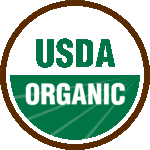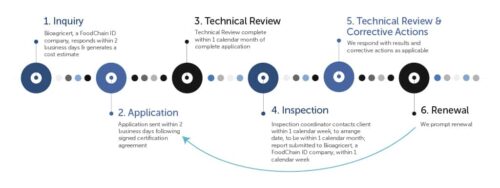The USDA National Organic Program (NOP) was established by congress to develop and enforce uniform national standards for organic products sold in the United States. Operating as a public-private partnership, the USDA accredits third-party certification agents – like FoodChainID’s own  Bioagricert – to certify that farms, processors and other related businesses meet the national organic standards. FoodChain ID works with the USDA to enforce the standards, protecting consumer confidence in the integrity of the USDA Organic Seal.
Bioagricert – to certify that farms, processors and other related businesses meet the national organic standards. FoodChain ID works with the USDA to enforce the standards, protecting consumer confidence in the integrity of the USDA Organic Seal.
A certifications pioneer for 33 years, FoodChain ID is a global leader in organic certification, with Bioagricert having certified over 1,000 USDA NOP approved operators and over 13,000 operators in Europe, Latin America and Southeast Asia.
Companies acquiring organic certification from FoodChain ID receive access to our proprietary multi-assessment supply chain management database. SupplyTrak® stores the documents required for certification in one location. It also; enables reuse of your supply chain information, provides status updates on where you are in the process, makes filling out forms easier with autofill, and enables FoodChain ID’s Non-GMO Project clients to share organic supply chain data with Non-GMO Project Verification data.
- All enterprises wishing to use the term “organic” to describe products must be certified to the USDA National Organic Program (NOP).
- Certification is available for all species of cultivated crops and wild-harvested plants and fungi, domesticated livestock and bees, and all kinds of processed products therefrom.
- Certification entails developing an Organic System Plan, which is reviewed by FoodChain ID’s technical experts, and then verified by an on-site inspection. The Organic System Plan details the production practices, materials input use, labeling, and supporting documentation necessary to show compliance with the NOP rules. If non-conformities with the rules are found, the operation has the opportunity to make corrections (except in rare cases where irremediable problems are found to exist).
- Certification is an annual process, whereby updates to the Organic System Plan are checked through desk review and on-site inspection.
- As part of routine surveillance and to fulfill accreditation requirements, Bioagricert includes unannounced inspections and residue testing as a certain percentage of its certification activities.

- We respond within 2 business days of an inquiry and generate a cost estimate based on information obtained about your site.
- An application and service agreement is sent out within 2 business days. Once returned, forms and or access to the SupplyTrak databases is provided for you to complete to describe your Organic System Plan. Once we submitted review the plan within one month.
- Upon approval of your plan, your file is sent to inspection. A FoodChain ID representative will reach out to you within a week to begin the process of scheduling your inspection.
- After the inspection is complete, your inspector will return his/her report to FCID/BAC (in 7 days) and we will review and issue a certification decision.
- The yearly renewal process is initiated via a communication sent to you 3 months prior to your previous year’s inspection to give you adequate time to comply.
The National Organic Program rules are specified in the Code of Federal Regulations at 7 CFR 205.
- USDA NOP Rule (from the US Code of Federal Regulations)
- National List of Allowed and Prohibited Substances
- NOP Program Handbook (additional guidance on specific aspects of the NOP rules)
- Certified clients are entitled to use the Bioagricert seal on qualifying products, at no extra charge.
- The USDA Organic seal is governed by the USDA. Labeling requirements can be found here.
FoodChain ID will provide a custom quote based on your operation type, estimated organic sales revenue, types of products you are looking to certify, desired equivalencies, number and location of facilities, and your inspection timeline.
Please contact sales@foodchainid.com if you are interested in a custom quote.
- If you think you want to export NOP-certified organic goods to a market controlled by another regulation (eg EU, Canada, Mexico, Japan, China, Korea, etc.) check with FoodChain ID and learn about possible restrictions or additional rules that may apply under those regimes.
- Don’t print retail labels with organic claims until they are formally approved by FoodChain ID /Bioagricert.
- Plan ahead for certification to allow enough time to get through the initial certification process.



